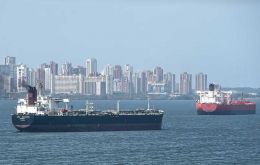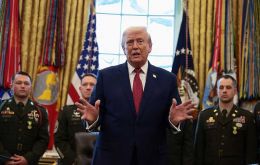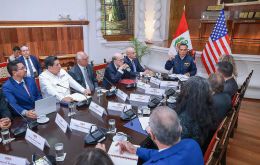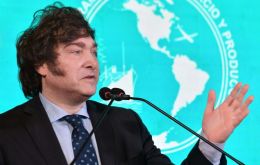MercoPress. South Atlantic News Agency
United States
-
Wednesday, December 17th 2025 - 21:05 UTC
Paraguay among key US allies, says Charge d’Affaires

Robert Alter, Charge d’Affaires at the United States Embassy in Asunción, has characterized Paraguay as one of the United States' most significant global allies. Speaking with Radio Ñandutí, Alter highlighted the strengthening of bilateral ties following the signing of a new security cooperation agreement aimed at dismantling organized crime.
-
Wednesday, December 17th 2025 - 13:42 UTC
White House expands travel ban to Palestinian Authority and other nations

US President Donald Trump issued a sweeping proclamation on Tuesday significantly expanding the administration's travel ban, citing national security concerns and inadequate screening procedures.
-
Wednesday, December 17th 2025 - 11:18 UTC
Trump orders total blockade of Venezuela's tankers

US President Donald Trump ordered on Tuesday a “total and complete” naval blockade of all sanctioned oil tankers traveling to and from Venezuela, marking the most aggressive move against Caracas' energy sector to date. The announcement came after the recent seizure of a sanctioned vessel.
-
Tuesday, December 16th 2025 - 09:50 UTC
US: Illicit fentanyl declared a weapon of mass destruction

US President Donald Trump signed an executive order on Monday formally designating illicit fentanyl as a Weapon of Mass Destruction (WMD). The move shifts the federal government's approach to the opioid crisis from a strictly public health and law enforcement issue to a national security priority.
-
Monday, December 15th 2025 - 10:14 UTC
Two dead in Rhode Island university shooting

A shooting on the campus of Brown University in Providence, Rhode Island, on Saturday left at least two people dead and eight seriously injured, reigniting national fears over gun violence at educational institutions.
-
Monday, December 15th 2025 - 09:08 UTC
Peru grants US troops access next year

Peruvian authorities have officially greenlighted the entry of United States military personnel for the entirety of 2026 to conduct joint training, support, and security assistance exercises with local armed and police forces, it was announced this weekend in Lima.
-
Friday, December 12th 2025 - 22:54 UTC
Are the UK and Argentina discussing easing Falklands-era weapons ban?

According to an interview of Argentine President Javier Milei published by The Telegraph this week, the South American country and the United Kingdom are in talks to lift the weapons ban in place since the 1982 Falklands/Malvinas War.
-
Thursday, December 11th 2025 - 22:48 UTC
US helped Machado escape Venezuela

Venezuelan opposition leader and Nobel Peace Prize laureate María Corina Machado confirmed on Thursday that she received assistance from the United States in her secret departure from the South American country after more than a year in hiding.
-
Thursday, December 11th 2025 - 10:14 UTC
Petro suggests Maduro moves on to “transitional government”

Colombian President Gustavo Petro has intensified diplomatic pressure on his Venezuelan counterpart, Nicolás Maduro, calling for a “general amnesty” and the formation of a “transitional government with the inclusion of all” to resolve Venezuela’s protracted political crisis.
-
Thursday, December 11th 2025 - 10:11 UTC
US seizes oil tanker off Venezuelan shores

The United States seized a large oil tanker in international waters off the coast of Venezuela on Wednesday in a high-stakes maritime operation, marking a significant escalation in the pressure campaign against the Bolivarian regime of Nicolás Maduro.
